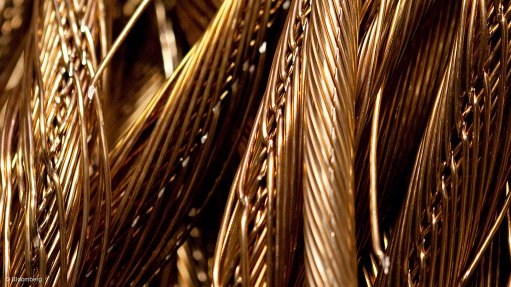
Photo by: Bloomberg
Although the level of copper theft had decreased to R12.9-million in May, from R13.6-million in April, the volume of copper theft had increased to 180 t, compared with 179 t in April, the South African Chamber of Commerce and Industry’s (Sacci’s) Copper Theft Barometer has revealed.
The chamber pointed out that the international average monthly spot price of copper had decreased to $5 849/t in May, from $6 432/t in April.
It added that South African exports of waste copper products had increased significantly to $7.2-million in March, from $3.4-million in January and $7-million in August 2014.
“The level of exports seems to be bucking a downward trend. According to the Multi-Commodity Exchange, the momentum on multiple timeframes is bearish with a descending tendency in the short and medium terms, although minor bounce backs can be expected.
“Base metals trading has been volatile on the London Metals Exchange; the swings reflecting uncertainty surrounding Greece and China, with little evidence that the situation in these countries will stabilise in the immediate term,” Sacci stated.
It cited recently published research by BNP Paribas fixed-income analyst Zhang Xiao and HSBC Business School Associate Professor Christopher Balding that had found strong evidence that Chinese copper stocks were being used “primarily to facilitate a carry trade under capital controls”.
Because of higher interest rates in China than in the rest of the world, Chinese investors borrowed money offshore, using a letter of credit from a bank to import copper and other metals. The metal was put into warehouses and the money was used to invest in higher-yielding assets such as property, financial products or manufacturing facilities.
It was estimated that as much as 70% of China’s refined copper imports were used to obtain financing rather than for actual consumption.
“Assuming that the research is accurate, the closer alignment of Chinese interest rates to global rates will reverse the demand for this method of obtaining finance. The demand for copper will, as a result, diminish.
“With depressed investment and a falling Chinese stock market there is little likelihood that the copper price will increase in the near future. There is already evidence that this is occurring as Chinese copper imports have been dropping,” Sacci said.
The chamber further pointed out that the Criminal Matters Amendment Bill, which had been approved for introduction to Parliament on June 24, would, once passed, ensure that mechanisms were put in place to safeguard infrastructure.
The proposed amendments provided for changes to the laws pertaining to infrastructure-related offences, such as cable theft and the theft of telephone lines.
Stricter provisions were provided for the granting of bail, sentencing of offenders and the creation of a new offence to criminalise damage to essential infrastructure caused by tampering or interfering with the functioning of basic services through criminal activity.
The Bill was now subjected to the Parliamentary process and stakeholders would be able to comment on it before it was promulgated.